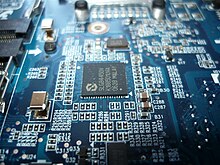Clock
A clock generator is a component that emits pulses at a specific frequency . It can be mechanical, electrical or electronic components or assemblies. The latter are required for data processing and synchronization, among other things. In calculating units, clock generators are often combined with a control unit.
Vibrations such as those implemented by pendulums , springs or torsion bars serve as mechanical clock generators . For astronomical clocks it is the seconds pendulum , in wristwatches the balance wheel or an oscillating quartz .
task
A clock clocks in an electronic arithmetic unit such as B. an addition circuit, the computing steps. The clock frequency is given in Hertz. With processors, the number of cycles is a value that can be used to specify the computing speed , such as 2000 Hz .
construction
The clock generator is often a common toggle switch , for example in the flasher unit . The clock generator in clocks, computers and communication devices is usually an oscillator with a quartz oscillator , from whose frequency higher and lower frequencies are generated by synthesis .
See also
- Clock signal - data technology
- Clocking - cellular or telephone tariff
- Metronome (acoustic, electrical, electronic or mechanical clock generator)
